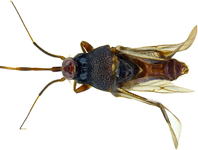Abstract
Crassolabium unicum sp. n., collected from a natural habitat in Vietnam, is described and illustrated. The new species is characterized by its 0.77–0.94 mm long body, three-layered cuticle, lip region offset by depression and 12–13.5 µm broad, odontostyle 13.5–15 µm long with wide aperture occupying 36–46% of its length, neck 235–260 µm long, pharyngeal expansion 117–131 µm long or occupying 47–52% of total neck length, anterior part of intestine presenting very distinct folds, female genital system didelphic-amphidelphic, uterus simple and 28–43 µm or 0.7–0.9 body diameters, vulva transverse (V = 45–52), prerectum bearing a blind postrectal sac, caudal region short and rounded (21–25 µm, c = 45–61, c’ = 0.6–0.8) with two (dorsal and ventral) lacunae between outer and intermediate cuticle layers, and male unknown. It is compared with the similar representatives of the genus.
References
Ahmad, W. & Jairajpuri, M.S. (1982) Some new and known species of Dorylaimoidea. Nematologica, 28, 39–61.
https://doi.org/ 10.1163/187529282X00501
Allgén, C.A. (1950) Westchwedische marine litorale und terrestrische Nematoden. Arkiv för Zoologi, 1, 301–344.
Álvarez-Ortega, S. & Peña-Santiago, R. (2013) Taxonomy of the genus Aporcelaimellus Heyns, 1965 (Nematoda, Dorylaimida, Aporcelaimidae). Zootaxa, 3669 (3), 243–260.
https://doi.org/10.11646/zootaxa.3669.3.3
Andrássy, I. (1963) Neue Art und Schlüssel der bisher bekannten Arten der Gattung Pungentus. Nematologische Notizen, 12. Annales Universitatis Scientiarum Budapestinensis de Rolando Eötvös Nominatae Sectio Biologica, 6, 3–12.
Andrássy, I. (2011) Phylum Nematoda. In: Gerlach, J. (Ed.), Crustacea, Platyhelminthes, Nematoda, Annelida and Tardigrada of the Seychelles Islands. Siri Scientific Press, Manchester, pp. 15–57. [2009]
Baermann, G. (1917) Eine einfache Methode zur Auffindung von Ankylostomum (Nematoden) Larven in Erdproben. Geneeskundig Tijdschrift voor Nederlandsch–Indië, 57, 131–137.
Eroshenko, A.S. (1976) [New species of nematodes of the genus Pungentus (Dorylaimidae) from forests of the Soviet Far East.] Zoologicheskii Zhurnal, 55, 1445–1454. [in Russian]
Flegg, J.J.M. (1967) Extraction of Xiphinema and Longidorus species from soil by a modification of Cobb’s decanting and sieving technique. Annals of Applied Biology, 60, 429–437.
https://doi.org/10.1111/j.1744-7348.1967.tb04497.x
Jabbari, H., Niknam, G., Vinciguerra, M.T., Moslehi, S., Abolafia, J. & Peña-Santiago, R. (2012) Description of Crassolabium persicum sp. n. (Nematoda, Dorylaimida, Qudsianematidae), an interesting species from Iran. Zookeys, 203, 55–63.
https://doi.org/10.3897/zookeys.203.3248
Man, J.G. de (1885) Helminthologische Beiträge. Tijdschrift der Nederlandische Dierkundige Vereeniging, 2, 1–26.
Peña-Santiago, R. & Ciobanu, M. (2011) The genus Crassolabium Yeates, 1967 (Nematoda, Dorylaimida): A monographic study. Monographic Papers on Nematology, 5, 1–195.
Siddiqi, M.R. (1964) Studies on Discolaimus spp. (Nematoda: Dorylaimidae) from India. Zeitschrift für Zoologische Systematik und Evolutionsforschung, 2, 174–184.
https://doi.org/10.1111/j.1439-0469.1964.tb00720.x
Thorne, G. (1974) Nematodes of the Northern Great Plains. Part II. Dorylaimoidea in part (Nemata: Adenophorea). South Dakota State University Agricultural Experiment Station Technical Bulletin, 41, 1–120.
Thorne, G. & Swanger, H.H. (1936) A monograph of the nematode genera Dorylaimus Dujardin, Aporcelaimus n. gen., Dorylaimoides n. gen., and Pungentus n. gen. Capita Zoologica, 6, 1–223.
Varela-Benavides, I. & Peña-Santiago, R. (2018) Description of Crassolabium costaricense sp. n. (Nematoda, Dorylaimida, Dorylaimidae) from Costa Rica. Nematology, 20, 1007–1014.
https://doi.org/10.1163/15685411-00003191
Vu, T.T., Ciobanu, M., Abolafia, J. & Peña-Santiago, R. (2010) Two remarkable new species of the genus Crassolabium Yeates, 1967 from Vietnam (Nematoda: Dorylaimida: Qudsianematidae). Journal of Natural History, 44, 2049–2064.
https://doi.org/10.1080/00222933.2010.481055
Yeates, G.W. (1967) Studies on nematodes from dune sands. 6. Dorylaimoidea. New Zealand Journal of Science, 10, 752–784.


